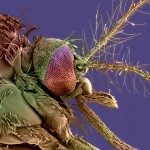Lien vers Pubmed [PMID] – 25421891
Viruses 2014 Nov;6(11):4628-63
Chikungunya virus (CHIKV) is a mosquito-borne alphavirus that causes chikungunya fever, a severe, debilitating disease that often produces chronic arthralgia. Since 2004, CHIKV has emerged in Africa, Indian Ocean islands, Asia, Europe, and the Americas, causing millions of human infections. Central to understanding CHIKV emergence is knowledge of the natural ecology of transmission and vector infection dynamics. This review presents current understanding of CHIKV infection dynamics in mosquito vectors and its relationship to human disease emergence. The following topics are reviewed: CHIKV infection and vector life history traits including transmission cycles, genetic origins, distribution, emergence and spread, dispersal, vector competence, vector immunity and microbial interactions, and co-infection by CHIKV and other arboviruses. The genetics of vector susceptibility and host range changes, population heterogeneity and selection for the fittest viral genomes, dual host cycling and its impact on CHIKV adaptation, viral bottlenecks and intrahost diversity, and adaptive constraints on CHIKV evolution are also discussed. The potential for CHIKV re-emergence and expansion into new areas and prospects for prevention via vector control are also briefly reviewed.

